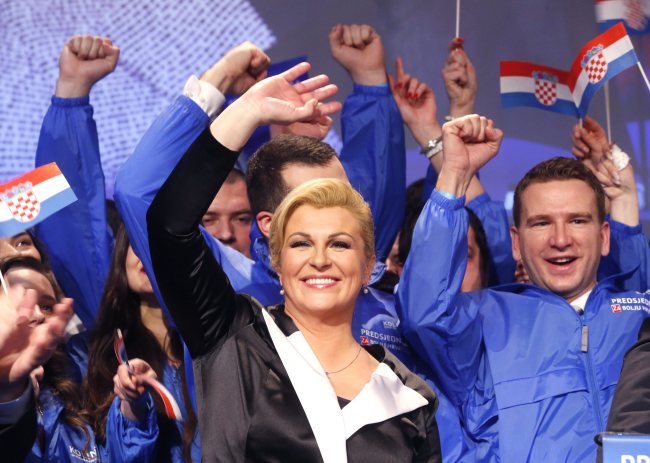ZAGREB (AFP) ― Opposition challenger Kolinda Grabar-Kitarovic was elected Croatia’s first female president on Sunday, narrowly winning a tight runoff vote with a pledge to kick-start the EU country’s ailing economy.
The politically conservative Grabar-Kitarovic, an ex-foreign minister and former NATO official, won 50.4 percent of the vote, according to results based on more than 99 percent of the ballots cast.
Her rival, centre-left incumbent Ivo Josipovic, garnered 49.6 percent of the vote, results released by the electoral commission showed.
“Grabar-Kitarovic won in a democratic battle and I congratulate her,” 57-year-old Josipovic told supporters at his Zagreb headquarters.
The politically conservative Grabar-Kitarovic, an ex-foreign minister and former NATO official, won 50.4 percent of the vote, according to results based on more than 99 percent of the ballots cast.
Her rival, centre-left incumbent Ivo Josipovic, garnered 49.6 percent of the vote, results released by the electoral commission showed.
“Grabar-Kitarovic won in a democratic battle and I congratulate her,” 57-year-old Josipovic told supporters at his Zagreb headquarters.

The 46-year-old candidate of the main opposition HDZ party will be the first woman to take the helm of the European Union’s newest member state.
She is also the first female head of state chosen by voters in the largely patriarchal Balkans region since Albania’s Jatifete Jahjaga was elected by parliament in 2011.
Sunday’s election for the mainly ceremonial post was held as Croatia, which became the EU’s 28th member in July 2013, grapples with a deep economic crisis.
“I will not let anyone tell me that Croatia will not be prosperous and wealthy,” Grabar-Kitarovic told jubilant supporters in the capital, calling for national unity to tackle the economic crisis.
Wearing a black dress with white lapels and clutching her husband’s hand, Grabar-Kitarovic smiled as supporters chanted her name in celebration of her victory.
“I urge all of you, including those who voted for others, let’s unite for a better life in Croatia ... a tough job awaits us,” she said.
Grabar-Kitarovic is Croatia’s fourth president since its independence from the former Yugoslavia in 1991.
During the campaign Josipovic, a popular former law professor and classical music composer who belongs to the Social Democrats, the main force in the ruling coalition, had also pledged to pump new life into the economy.
Observers said the presidential election gave voters a chance to voice their dissatisfaction with the SDP-led government’s performance and Josipovic’s failure to criticize its economic policies.
Turnout was 58.90 percent ― some 12 percent more than in the first round held two weeks ago.
Although presidential powers are limited in Croatia, Sunday’s vote was seen as a key test ahead of parliamentary elections later this year in which Grabar-Kitarovic’s HDZ is likely to make significant gains.
The government of Prime Minister Zoran Milanovic has become increasingly unpopular as Croatia struggles to emerge from a six-year recession.
“The recession ... is not only the consequence of the global crisis in 2008.
The problems rather are structural and the authorities have not been solving them,” economic analyst Damir Novotny told AFP.
Hopes that entry into the EU would provide an economic boost for the small Adriatic nation of 4.2 million have faded.
Croatia’s economy remains among the EU bloc’s weakest. Unemployment stands at almost 20 percent, rising to 50 percent for the under-25s, and the government forecasts a meagre 0.5 percent growth this year.
Analysts say the ruling coalition has failed to reform the huge and inefficient public sector, improve the business climate or attract EU development funds.
During her campaign Grabar-Kitarovic labelled Josipovic the “incapable and cold-hearted government’s accomplice” in bringing about economic hardship.
Josipovic countered that his rival would not bring change given that she was a minister in the graft-plagued HDZ government headed by former prime minister Ivo Sanader ― who was tried and jailed for corruption.
-
Articles by Korea Herald







![[KH Explains] Hyundai's full hybrid edge to pay off amid slow transition to pure EVs](http://res.heraldm.com/phpwas/restmb_idxmake.php?idx=644&simg=/content/image/2024/04/18/20240418050645_0.jpg&u=20240419100350)







![[From the Scene] Monks, Buddhists hail return of remains of Buddhas](http://res.heraldm.com/phpwas/restmb_idxmake.php?idx=652&simg=/content/image/2024/04/19/20240419050617_0.jpg&u=20240419175937)

![[KH Explains] Hyundai's full hybrid edge to pay off amid slow transition to pure EVs](http://res.heraldm.com/phpwas/restmb_idxmake.php?idx=652&simg=/content/image/2024/04/18/20240418050645_0.jpg&u=20240419100350)

![[Today’s K-pop] Illit drops debut single remix](http://res.heraldm.com/phpwas/restmb_idxmake.php?idx=642&simg=/content/image/2024/04/19/20240419050612_0.jpg&u=)